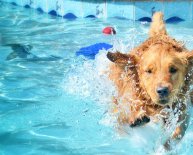
Puppy Jacksonville FL

Jacksonville Pet Vaccines
Vaccines are an essential aspect of any preventative medicine program.
Pet vaccines have proved to be an invaluable tool in protecting our pets from fatal diseases, but that does not mean some thought shouldn’t be given to how they are administered. Mandarin Animal Hospital tailors its vaccination protocol to guidelines established by the American Veterinary Medical Association, American Animal Hospital Association, Association of Feline Practitioners, the lifestyle of your pet, as well as the diseases he or she is most likely to be exposed to. During your kitten’s or puppy’s first year of life we also spread out the series of vaccines in order not to put too much strain on his or her developing immune system.
We do this in order to provide the best protection from disease as well as to reduce the possibility of your pet have an adverse reaction to a vaccine.
Dog/Canine Vaccines
After your puppy receives its first year series of vaccines, we like to move our patients to the three year vaccination protocol for DA2PP and Rabies vaccines. We recommend your pet remain on the yearly protocol for Leptospirosis, H3N8 and Lyme if indicated based on your pet’s lifestyle and exposure potential.
We also like to immunize our patients every six months for Bordetella and perform a fecal analysis for internal parasites on that same schedule. Yearly heartworm testing is also performed.
 Cat/Feline Vaccines
Cat/Feline Vaccines
After a kitten has gone through its first year series of pet vaccines, we recommend moving to the three year protocol for the FVRCP vaccine. Unlike with canines, we recommend our feline friends receive a yearly Rabies vaccine due to the effectiveness and safety of the Merial Recombinant Rabies vaccine that we use. If it is indicated by the lifestyle and exposure potential of your cat, we also recommend the annual Feline Leukemia Vaccine.
Finding a Lost Pet: Pet Microchipping
There is nothing more painful than the thought of a lost pet, especially if you are away from home on vacation or visiting friends. How will your pet find its way home?
The fact is that at one time or another in our pets’ lives they will find a way out of the house or off their leash. Most of the time, they will find their way home on their own, but too often pets become lost and are picked up by a well-meaning stranger or animal control officer and delivered to a shelter. If this happens to your cat or dog, a collar alone may not be enough, especially if the tag falls off or you are away from home and cannot be reached at the number on the tag.
Lost pet microchip IDs are a safe, simple and effective way to prevent your pet from becoming permanently lost. The microchip is about the size of a grain of rice and is implanted beneath your pet’s skin, usually between the shoulder blades. The procedure only takes a minute or two to perform and is painless.
 The microchip is encoded with your pet’s vital information, which can be read by scanners at veterinary hospitals and shelters across the country and around the world. Once the information in the chip is read, it can be used to easily reunite you with your beloved companion.
The microchip is encoded with your pet’s vital information, which can be read by scanners at veterinary hospitals and shelters across the country and around the world. Once the information in the chip is read, it can be used to easily reunite you with your beloved companion.
Mandarin Animal Hospital uses a universally read microchip system that is recognized not only across the United States, but throughout South and Central America, Europe, Australia, New Zealand and South Korea.
Caring for Your New Puppy or Kitten
Puppies and Kittens are a lot of fun to have in the home, but they require some special attention in order to assure they are a happy and healthy companion for years to come. This means that comprehensive physical exams at key developmental stages are important.
Because we want to help our clients give their new family member the best start possible, we strongly recommend our protocol for first year vaccines and examinations. In order to make these visits more affordable to our clients we only charge an examination fee on the first series of immunizations even though we perform an examination on all subsequent visits in the series.
Our first year protocol includes an initial wellness examination, screening for damaging parasitic infections such as worms or giardia, an initial dental exam, nutritional advice, and more. For puppies we advise the start of medicines to prevent Heartworm, and arranging their first grooming session. Additionally, at six months of age we recommend spaying or neutering your pet.
Vaccines are also very important. Because we take a balanced approach to the care of your puppy or kitten, Mandarin Animal Hospital spreads out vaccine visits. This ensures your new pet’s immune system adequately responds and recovers from each vaccine challenge.
These regular visits also provide you with opportunities to ask all the questions that come to mind regarding your pet’s care and give us a chance to become acquainted with your blossoming cat or dog.
Care for Your Senior Pet
Dogs and cats in their senior years may be a bit less active, but they are very loving and satisfying companions. They also require additional veterinary care in order to keep them healthy and detect early signs of treatable disease. This is all the more true since their metabolism slows and they are more susceptible to a variety of cancers.
We still recommend yearly wellness exams, vaccination boosters, regular parasite screenings, grooming, heartworm prevention, and dental exams. However, after your pet reaches six years of age—a little younger for some and older for some others—we also recommend a geriatric exam.





















